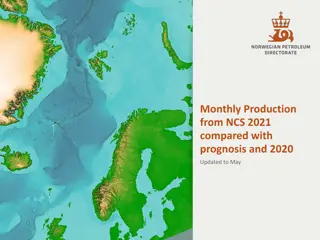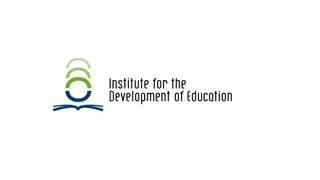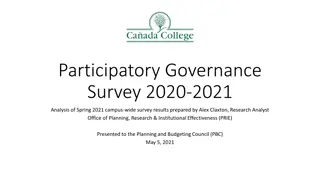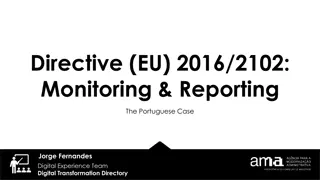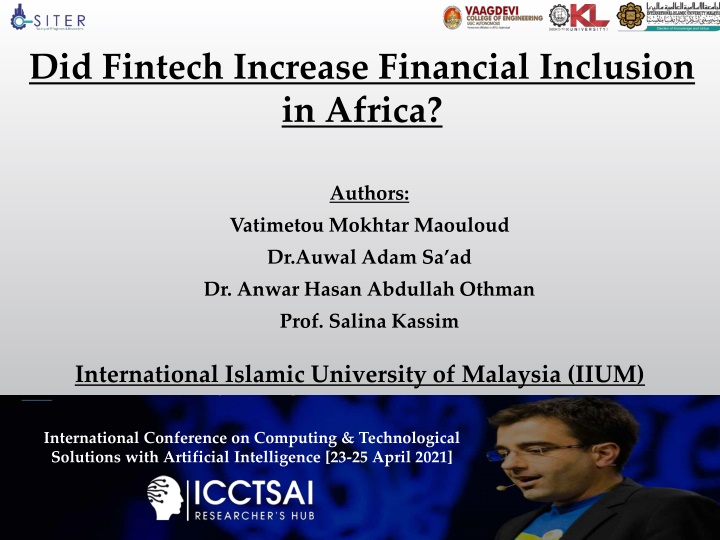
Fintech's Impact on Financial Inclusion in Africa
Explore how Fintech and AI are addressing financial exclusion in Africa, focusing on the potential for economic growth and poverty reduction through innovative technologies.
Download Presentation

Please find below an Image/Link to download the presentation.
The content on the website is provided AS IS for your information and personal use only. It may not be sold, licensed, or shared on other websites without obtaining consent from the author. If you encounter any issues during the download, it is possible that the publisher has removed the file from their server.
You are allowed to download the files provided on this website for personal or commercial use, subject to the condition that they are used lawfully. All files are the property of their respective owners.
The content on the website is provided AS IS for your information and personal use only. It may not be sold, licensed, or shared on other websites without obtaining consent from the author.
E N D
Presentation Transcript
Did Fintech Increase Financial Inclusion in Africa? Authors: Vatimetou Mokhtar Maouloud Dr.Auwal Adam Sa ad Dr. Anwar Hasan Abdullah Othman Prof. Salina Kassim International Islamic University of Malaysia (IIUM) International Conference on Computing & Technological Solutions with Artificial Intelligence [23-25 April 2021]
Contents Introduction Problem Statement and Research Gaps Objective and Research Question Theory Methodology Results Conclusions Limitations and Futures Studies International Conference on Computing & Technological Solutions with Artificial Intelligence [23-25 April 2021]
Introduction Poverty is a devastating problem that affects many people worldwide, especially as it is still happening during a seemingly progressive and socially advanced era. The World Bank (2018) projects in its latest estimation that by 2030 the poverty in Sub-Saharan African countries will be around 90 per cent. Financial inclusion is also very low in African countries. Thus, an inclusive economic growth cannot be achieved without providing a variety of financial services by the institutions (Lal, 2018). International Conference on Computing & Technological Solutions with Artificial Intelligence [23-25 April 2021]
Introduction Artificial intelligence is the use of new technologies in different life domains. In finance, the use of AI has enhanced the utilisation of financial services in several countries (Kshetri, 2021). FinTech is a portmanteau for financial technology that numerous banks and companies use to reduce the physical distancing for people to enable and ease access to the financial services offered (Kusimba, 2018; Lee, 2020). International Conference on Computing & Technological Solutions with Artificial Intelligence [23-25 April 2021]
Problem Statement The majority of developing countries population are excluded from the formal financial system (Kshetri, 2021). There are around 1.7 billion people worldwide who have neither a formal financial account nor a mobile banking account. The financial exclusion rate is also high among microenterprises, and small and medium enterprises (SME), where 200 million of them lack finance (IFC, 2017). International Conference on Computing & Technological Solutions with Artificial Intelligence [23-25 April 2021]
Research Gaps Even though the use of AI has been widely discussed in developed countries, African countries are still left behind and lack actual representation in research and application of Artificial intelligence in their societies. Looking into the several difficulties facing African countries, particularly poverty and financial exclusion, the embracement of AI as a mechanism to alleviate them is limited (Achugamonu, Adegbite, Omankhenlen, Okoye, & Isibor, 2020). Thus, this study explores the extent to which AI is used to enhance the financial inclusion rate among African countries where a scarcity of study exists. International Conference on Computing & Technological Solutions with Artificial Intelligence [23-25 April 2021]
Objective and Research Question RO. To determine the impact of using Fintech on Financial Inclusion in Africa. RQ. Does Fintech impact Financial Inclusion in Africa? International Conference on Computing & Technological Solutions with Artificial Intelligence [23-25 April 2021]
Theory The primary purpose of using Fintech is to reduce the risk of market anomalies, such as asymmetric information. This study is underpinned by the transaction cost innovative theory (Niehans, 1983). This theory is used because it matches the evolution and development of AI and fintech in the era of industry 4.0. Indeed, the advancement of AI is resulting in the reduction of transaction costs which enables better communication and use of information between lenders and borrowers. International Conference on Computing & Technological Solutions with Artificial Intelligence [23-25 April 2021]
Methodology This paper uses a content analysis methodology through a systematic literature review to determine the impact of AI on financial inclusion in African countries. The research has been focused on keywords such as artificial intelligence , digital finance , fintech , financial inclusion , and African countries . The review was performed in various well-known and high indexed databases: Scopus, Elsevier science direct, Tailor & Francis, EBSCO, and JSTOR using (Kitchenham, 2004) guideline. Following the articles' selection based on the abstract and full-text screening, only 11 were maintained. The majority of articles are published in the past three years. International Conference on Computing & Technological Solutions with Artificial Intelligence [23-25 April 2021]
Findings Based on the most recent literature reviewed in this study, it is observed that African countries use mostly mobile phones and crowdfunding technologies. These two technologies are the most influential factors that increased digital financial inclusion among Africans. It has also been found that the main barriers which hamper African countries from developing Fintech Fintech models are the weak financial infrastructure, poverty, and low internet connectivity. Hence, it is recommended to the African governments and decisionmakers to adopt initiatives that can enhance the use of technology to alleviate poverty and achieve inclusive economic growth. International Conference on Computing & Technological Solutions with Artificial Intelligence [23-25 April 2021]
Conclusions The study has discussed the role of AI on financial inclusion in the African context. It has been found that Fintech Fintech boosts financial inclusion in Africa, especially through mobile money and crowdfunding platforms. Although AI is not well spread in Africa, and most countries are still not using it, it has a predominantly and positive effect on countries' economic that made use of it so far. To reach a high financial inclusion rate among the developing countries, a focus on artificial intelligence is indispensable. International Conference on Computing & Technological Solutions with Artificial Intelligence [23-25 April 2021]
Limitations and future studies This study is a conceptual paper where no empirical data was collected. Therefore, future studies can use primary data collected from selected African countries to get more findings and interpretations to explore the impactful role of AI in financial inclusion. Also, this research has a limited geographical context, a general context which can involve more regions can be conducted in the near future. The COVID 19 effect of AI can also be studied further. International Conference on Computing & Technological Solutions with Artificial Intelligence [23-25 April 2021]
International Conference on Computing & Technological Solutions with Artificial Intelligence [23-25 April 2021]








